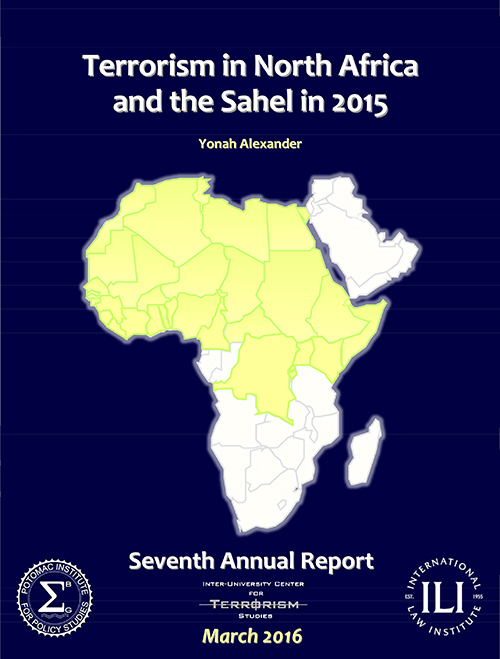 On March 30, 2016, the Inter-University Center for Terrorism Studies (IUCTS) published its seventh annual report, “Terrorism in North Africa and the Sahel in 2015,” authored by Prof. Yonah Alexander, Director-IUCTS. The report finds the region & global community facing the most serious security challenges since 9/11, from natural and man-made threats ranging from Ebola to extremism. The rise of the co-called “Islamic State” (Daesh) and the resilience of al-Qa’ida and their affiliates in Africa in 2015 have resulted in much greater instability on the continent with a costly strategic impact inter-regionally. The study recommends the U.S. & allies engage more effectively to slow a security crisis that is erupting across Africa’s “arc of instability.” Other recommendations include:
On March 30, 2016, the Inter-University Center for Terrorism Studies (IUCTS) published its seventh annual report, “Terrorism in North Africa and the Sahel in 2015,” authored by Prof. Yonah Alexander, Director-IUCTS. The report finds the region & global community facing the most serious security challenges since 9/11, from natural and man-made threats ranging from Ebola to extremism. The rise of the co-called “Islamic State” (Daesh) and the resilience of al-Qa’ida and their affiliates in Africa in 2015 have resulted in much greater instability on the continent with a costly strategic impact inter-regionally. The study recommends the U.S. & allies engage more effectively to slow a security crisis that is erupting across Africa’s “arc of instability.” Other recommendations include:
- “Strengthen U.S. and NATO intelligence assets by broadening cooperation through AFRICOM, NATO’s Partnership for Peace, and other modalities that supply and support training, equipment, and monitoring of resources throughout the region”;
- “Continue to expand U.S. counterterrorism technical assistance and training to internal security personnel”;
- “Work to settle intra-regional conflicts that provide openings for extremists to exploit and impede security and economic cooperation — including the Western Sahara dispute and the problem of refugees in the Polisario-run camps in Algeria;
- “Recognize the importance of and provide quiet encouragement to Muslim leaders in promoting the practice of a moderate Islam, as well as counter-radicalization programs that limit the appeal of extremist recruiters”;
- And “Promote regional trade and investment by expanding the US-Morocco Free Trade Agreement to include goods and products from North, West, and Central Africa."
Download the full pdf here.
